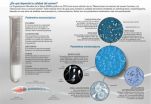(Press-News.org) Teenagers spend a lot of time texting, receiving an average of 3,417 texts a month, or 114 per day, according to the Nielsen consumer research group.
A new study from the University of Arizona looks at the feasibility of using text messaging to deliver educational information about nutrition and physical activity to teens.
The study, which appears in the January-February issue of the Journal of Nutrition Education and Behavior, looks at whether teenagers would be interested in receiving texts about health on their phones and how they would like those messages presented.
Conducted over a one-year period, the study of 177 adolescents, ages 12-18, found that most teens were open to receiving such texts, but the way in which they were worded made a big difference.
"Kids are texting all the time, so it's a communication they're very familiar with and it appeals to them," said Melanie Hingle, UA assistant research professor of nutritional sciences and lead author of the study. "But we realized very quickly once we got down to the actual development of the messages that we didn't know the first thing about what kind of tone or information kids would be interested in."
Researchers quickly learned – and this may come as no surprise to those with teenagers at home – that the teens didn't like to be told what to do. Therefore, phrases like "you should," "always" and "never" did not go over well, while softer words like "try" and "consider" were much better received. Likewise, texts introduced by the words "did you know" also generally were disliked, with teens saying the phrase made them immediately not want to know whatever came next.
Texts the teens liked best included those that specifically referenced their age group, such as, "American girls aged 12-19 years old drink an average of 650 cans of soda a year!" They also liked messages that were interactive, like fun quizzes; messages that were actionable, like simple recipes; and messages that included links to websites where they could learn more about a topic if desired.
The teens also appreciated the occasional fun fact not necessarily related to health – some bit of trivia they could share with their friends, like the fact that carrots were originally purple or that ears of corn have an even number of rows.
And they didn't want to be inundated with texts – no more than two a day.
Hingle, a registered dietitian, says she sees text messaging as a potentially valuable supplement to in-person nutrition education and fitness programs for teens.
"A lot of the previous interventions that have been developed in nutrition are very top-down, in that we're the experts and we're telling people what to do," Hingle said. "We didn't want to do that in these text messages, and we didn't think it was very effective, so we had kids at every step of the process working with us to help us to come up with topics and refine the voice and style."
Now that researchers know teens are open to receiving health information via text, it could pave the way for the development of future text message-based programs.
"When we started, we didn't even know if this was a good idea because phones are used to contact your friends and for social engagements, not about educational messages," said Mimi Nichter, UA professor of anthropology and co-author of the study.
"What we, as anthropologists, wanted to know about the culture of kids was: What does health mean to them, and given that, what do you offer them? What's palatable for them, not just for the mouth, but for their way of thinking?" said Nichter, who has for years studied body image, food intake and dieting among teens.
The texting study was part of a larger USDA-funded study at the UA exploring how mobile technology may be used to promote healthy lifestyles for teens. The interdisciplinary project, dubbed "Stealth Health," has united researchers across the UA campus in research and development projects related to mobile health applications.
Promoting health and physical activity during the teen years can be critical, with the risk for developing obesity increasing during adolescence, Hingle said.
"They're at the age right now that they start making decisions for themselves with regard to food and physical activity," she said. "Up until about middle school, parents are a lot more involved in making those decisions, so from a developmental standpoint, it's a good time to intervene."
### END
UA explores promoting teen health via text message
A study of 177 teenagers looks at whether teens are open to receiving text messages about health and what kind of information those messages should contain
2013-01-18
ELSE PRESS RELEASES FROM THIS DATE:
Abortions are safe when performed by advanced practice nurses and physician assistants, study shows
2013-01-18
First trimester abortions are just as safe when performed by trained nurse practitioners, physician assistants and certified nurse midwives as when conducted by physicians, according to a new six-year study led by UCSF.
The study posted online today in the American Journal of Public Health in advance of the print edition.
The publication comes a week before the 40th anniversary of the Roe vs. Wade, the landmark Supreme Court decision that made abortion legal in the United States.
Currently in the United States, a patchwork of state regulations determines who can ...
Exposure to COI policies during residency reduces rate of brand antidepressant prescriptions
2013-01-18
Philadelphia – Psychiatrists who are exposed to conflict-of-interest (COI) policies during their residency are less likely to prescribe brand-name antidepressants after graduation than those who trained in residency programs without such policies, according to a new study by researchers from the Perelman School of Medicine at the University of Pennsylvania. The study is the first of its kind to show that exposure to COI policies for physicians during residency training – in this case, psychiatrists – is effective in lowering their post-graduation rates of prescriptions ...
Powerful people better at shaking off rebuffs, bonding with others
2013-01-18
Employees often tiptoe around their bosses for fear of offending them. But new research from the University of California, Berkeley, shows people in power have thicker skin than one might think.
A UC Berkeley study has found that people in authority positions – whether at home or in the workplace - are quicker to recover from mild rejection, and will seek out social bonding opportunities even if they've been rebuffed.
"Powerful people appear to be better at dealing with the slings and arrows of social life, they're more buffered from the negative feelings that rejection ...
Physical and sexual assault linked to increased suicide risk in military
2013-01-18
According to results of a new study by researchers at the University of Utah, military personnel experience increased risk of suicidal thoughts or actions if they were the victims of physical or violent sexual assault as adults. In contrast, undergraduate students experience increased risk of suicidal thoughts or actions if they were the victims of unwanted sexual experiences as children or adults.
While other research has shown that victims of sexual or physical assault are at increased risk of health problems—including suicide—the majority of that work has focused on ...
Melt ponds cause the Artic sea ice to melt more rapidly
2013-01-18
The Arctic sea ice has not only declined over the past decade but has also become distinctly thinner and younger. Researchers are now observing mainly thin, first-year ice floes which are extensively covered with melt ponds in the summer months where once metre-thick, multi-year ice used to float. Sea ice physicists at the Alfred Wegener Institute, Helmholtz Centre for Polar and Marine Research (AWI), have now measured the light transmission through the Arctic sea ice for the first time on a large scale, enabling them to quantify consequences of this change. They come to ...
Which nutritional factors help preserve muscle mass, strength and performance in seniors?
2013-01-18
January 17, 2013--Nyon, Switzerland
Sarcopenia, or the gradual loss of muscle mass, is a common consequence of ageing, and poses a significant risk factor for disability in older adults. As muscle strength plays an important role in the tendency to fall, sarcopenia leads to an increased risk of fractures and other injuries.
The International Osteoporosis Foundation (IOF) Nutrition Working Group has published a new review which identifies nutritional factors that contribute to loss of muscle mass, or conversely, are beneficial to the maintenance of muscle mass. The Group ...
Cell: Protein folding via charge zippers
2013-01-18
This press release is available in German.
Membrane proteins are the "molecular machines" in biological cell envelopes. They control diverse processes, such as the transport of molecules across the lipid membrane, signal transduction, and photosynthesis. Their shape, i.e. folding of the molecules, plays a decisive role in the formation of, e.g., pores in the cell membrane. In the Cell magazine, researchers of Karlsruhe Institute of Technology and the University of Cagliari are now reporting a novel charge zipper principle used by proteins to form functional units ...
The cell that isn't
2013-01-18
This may look like yet another video of a dividing cell, but there's a catch. You are looking at chromosomes (red) being pulled apart by the mitotic spindle (green), but it's not a cell, because there's no cell membrane. Like a child sucking an egg out of its shell, Ivo Telley from the European Molecular Biology Laboratory (EMBL) in Heidelberg, Germany, removed these cellular 'innards' from a fruit fly embryo, at a stage when it is essentially a sac full of membrane-less 'cells' that divide and divide without building physical barriers to separate themselves from each other.
"It's ...
Increasing concerns surrounding surrogacy
2013-01-18
COUPLES seeking to build a family, and surrogate mothers overseas who help them, are in danger of emotional, physical and financial exploitation unless UK authorities monitor and regulate the field much more closely, according to a University of Huddersfield professor who has published the results of a detailed investigation.
Eric Blyth – Professor of Social Work at the University of Huddersfield, and based at its Centre for Applied Childhood Studies – is co-author of The changing face of surrogacy in the UK, an article which charts the rapid increase in the numbers of ...
Semen quality of young men in south-east Spain down by 38 percent in the last decade
2013-01-18
The first comparative study on the evolution of sperm quality in young Spanish men over ten years, headed by researchers at the University of Murcia, reveals that spermatozoid concentration in men between 18 and 23 years in the regions of Murcia and Almeria has dropped by an annual average of 2%.
The suspicion that the semen of Spanish men is losing quality now takes force in the case of young men from Murcia and Almeria.
The 'Andrology' journal has published a multidisciplinary and international study, headed by the Department of Preventative Medicine and Public ...
LAST 30 PRESS RELEASES:
Korea University, Stanford University, and IESGA launch Water Sustainability Index to combat ESG greenwashing
Molecular glue discovery: large scale instead of lucky strike
Insulin resistance predictor highlights cancer connection
Explaining next-generation solar cells
Slippery ions create a smoother path to blue energy
Magnetic resonance imaging opens the door to better treatments for underdiagnosed atypical Parkinsonisms
National poll finds gaps in community preparedness for teen cardiac emergencies
One strategy to block both drug-resistant bacteria and influenza: new broad-spectrum infection prevention approach validated
Survey: 3 in 4 skip physical therapy homework, stunting progress
College students who spend hours on social media are more likely to be lonely – national US study
Evidence behind intermittent fasting for weight loss fails to match hype
How AI tools like DeepSeek are transforming emotional and mental health care of Chinese youth
Study finds link between sugary drinks and anxiety in young people
Scientists show how to predict world’s deadly scorpion hotspots
ASU researchers to lead AAAS panel on water insecurity in the United States
ASU professor Anne Stone to present at AAAS Conference in Phoenix on ancient origins of modern disease
Proposals for exploring viruses and skin as the next experimental quantum frontiers share US$30,000 science award
ASU researchers showcase scalable tech solutions for older adults living alone with cognitive decline at AAAS 2026
Scientists identify smooth regional trends in fruit fly survival strategies
Antipathy toward snakes? Your parents likely talked you into that at an early age
Sylvester Cancer Tip Sheet for Feb. 2026
Online exposure to medical misinformation concentrated among older adults
Telehealth improves access to genetic services for adult survivors of childhood cancers
Outdated mortality benchmarks risk missing early signs of famine and delay recognizing mass starvation
Newly discovered bacterium converts carbon dioxide into chemicals using electricity
Flipping and reversing mini-proteins could improve disease treatment
Scientists reveal major hidden source of atmospheric nitrogen pollution in fragile lake basin
Biochar emerges as a powerful tool for soil carbon neutrality and climate mitigation
Tiny cell messengers show big promise for safer protein and gene delivery
AMS releases statement regarding the decision to rescind EPA’s 2009 Endangerment Finding
[Press-News.org] UA explores promoting teen health via text messageA study of 177 teenagers looks at whether teens are open to receiving text messages about health and what kind of information those messages should contain


